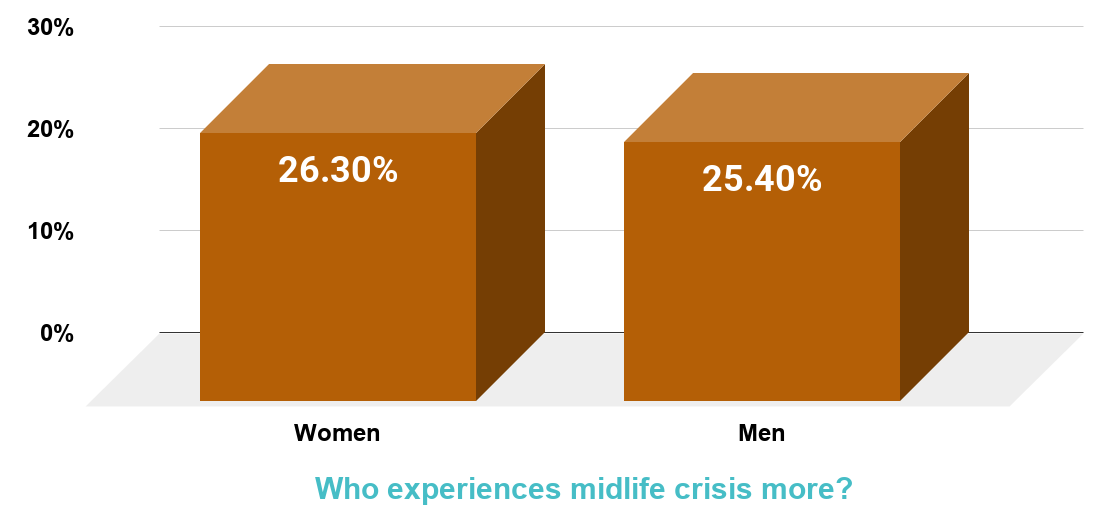What Is A Midlife Crisis For A Woman? 19 Signs and Solutions
WhatToGetMy Instructional Article
- In this article, we unpack all that you need to know about women and midlife crisis.
There used to be a myth that the midlife crisis affected only men. The midlife crisis was often characterized by men who in their middle age bought flashy cars and dated younger women and in some cases changed their wardrobe and appearance to include biker jackets and the works. People in the past used to take the issue lightly, making fun of persons who were jokingly referred to as going through one, in those cases men. But there is nothing to joke about when it comes to dealing with a midlife crisis. It is serious for persons who pass through it. In some cases, it has led to suicide, and that is why discussions on it ought to be taken seriously. Importantly, persons who go through it should not be made fun of but should be lovingly assisted in whatever way one can, and to the extent that they want to be assisted.
Few still hold the myth that women do not experience midlife crisis and in this article, we will be debunking that myth and answering all the pertinent questions about midlife crisis in women.
What Does Mid Life Crisis Mean?
Table of Contents
According to Andrew Oswald and Ahmed Tohamy in their 2017 academic discussion paper on “Female Suicide and the Concept of the Midlife Crisis, which you can read here, the idea of humans experiencing what is now known as “the midlife crisis”, was first proposed in the 1960s by the person known as Elliot Jacques. According to them, Elliot Jacques believed that at midlife, the average person “ starts to foresee death and to evaluate the meaning of their own life.”
The authors argued that many made fun of Jacques back in 1960 when he suggested such a concept. But in recent times, we now know that Mr. Jacques was correct and people come to that point in their life where they start to reevaluate their lives and ask if there is any meaning or point to it all. That is what the midlife crisis means. It is that period in the lives of men and women when they start to feel like they haven’t accomplished much in their life and yet they appear to be aging quickly and nearing death.
What Causes A Midlife Crisis? Why Midlife Crisis Happens.
There is little known scientific explanation about what causes the midlife crisis. But what seems to come out clearly, at least among those who have experienced it, or are currently experiencing it, is that it is brought about by the following factors/causes:
- A feeling of aging too quickly and losing relevance;
- Suddenly being all too aware of one’s mortality and feeling like the person has not accomplished much;
- These in turn then lead to depression and onset of the midlife crisis.
According to Wikipedia, a distinction needs to be drawn between midlife stressors and midlife crisis. Stressors could be stress factors like being overworked and the likes, although these could contribute to the onset of a midlife crisis.
Do Women Go Through Midlife Crisis? Women And Midlife Crisis.
Gone are the days when it was believed that the midlife crisis was the sole domain of men. According to a study in the year 2000 by an academic at the University of Cornell, and mentioned in the Guardian, women appeared to have experienced the midlife crisis more than their male counterparts.
A study in the year 2000 by Elaine Wethington, a sociology professor at Cornell University in New York State suggests that women experience midlife crisis than men. Source: The Guardian

So, the short answer is, yes. Women go through the midlife crisis. It may seem like they don’t because they are seemingly always busy as caregivers that we seem to hardly notice if and when they go through or exhibit those stereotypical signs of the midlife crisis that are seen in the men. But they express the midlife crisis much like their male counterparts.
What Age Does A Woman Have A Midlife Crisis?
The specific age when a woman starts experiencing the midlife crisis would defer from woman to woman. But generally, it starts setting in at middle age, which is usually the ages of 40 – 65. In general, however, the average age for midlife crisis especially for women, has been said to be the ages of 35 – 50.
What Happens During A Midlife Crisis? 9 Signs And Symptoms Of A Midlife Crisis For A Woman.
Midlife crisis is not a disease, and so one cannot necessarily say a woman who has it has symptoms. Since it is more of an emotional and psychological state, it is rather to be referred to as a state or phase, with some peculiar signs.
And the signs are generally the same for both men and women. They generally feel like they are aging too quickly when they start going through a midlife crisis. They start to feel like they haven’t accomplished much, and this can sometimes lead to feelings of shame and discontent.
When it comes specifically to women, you may start to see the following signs:
1. She starts to compare herself to women younger than her.
In worst cases, she may start to despise younger women for their youth and treat them contemptuously.
2. She may get involved in an adulterous affair with a younger man if she is married.
Some married women may even go as far as asking for a divorce. If she is still single, she may start looking for a mostly sexual relationship with a younger man.
3. She may drastically change her wardrobe and appearance.
For some, it may include changing their hair color to something as bold as a sharp red color. Some may even change their wardrobe entirely. Some may buy flashy cars as the men do.
4. She may experience serious changes in her weight.
She may gain weight considerably or lose weight considerably within a short space of time. This is usually brought about because of feeling less attractive and worrying too much about her appearance.
5. She is constantly irritable.
This is because of sharp mood swings brought about by feeling unhappy about her life and what she feels she may not have accomplished.
6. She feels very dissatisfied and discontent with her life.
She may start to question her usefulness and whether she has accomplished anything of substance or value with her life.
7. She loathes reunions and any gathering where she has to be reminded of things she feels she hasn’t accomplished.
This is especially the case if she feels like some of her peers have achieved considerably more than her. She would not like to be around them because it would make her feel all the less accomplished.
8. She may start to feel like she is losing everything that defines her.
This tends to happen a lot to women who were full-time moms and whose children start leaving the house. With no children around for her to keep taking care of, she may start to feel as though she is not doing anything of accomplishment anymore.
9. She becomes apathetic and generally disinterested in life.
This happens because she feels like since she hasn’t accomplished much and since her life has pretty much reached a dead-end, there is no point in bothering much with anything.
How Long Does Midlife Crisis Last For Women?
The duration of a midlife crisis for a woman varies from woman to woman. It could last anything from as low as 2 – 3 years to as high as 5 years. Ultimately, it will depend on the woman and her way of handling that period of crisis. How she handles it will largely determine and define how long it will last for her. And that is why in the next section, we give you helpful ways to deal with a midlife crisis.
How Do You Deal With A Midlife Crisis? 10 Ways How To Deal With Midlife Crisis Symptoms.
How badly the whole midlife crisis will affect you as a woman will depend to a large extent on how you deal with it when it arises. Here are helpful ways to deal with the midlife crisis symptoms you may be experiencing.
1. Ask yourself why you are feeling discontent and unfulfilled.
Understanding the root causes of why you feel discontented and unfulfilled will help you in navigating the next steps. Ask yourself what it is about your life that makes you feel that way and write them down. Writing them down will help you come to terms with it because being in denial about them will only make it worse and impossible to deal with it.
2. Understand that feeling the way you are feeling is not a bad thing at all, but a good thing because it will guide you to redefine your life and priorities.
Feelings of discontent and disillusion are never bad things, and we need to change the perception that those feelings mean that something is wrong with us. Those feelings are our innermost compass to guide us to aspire to more, and desire to achieve more. Those feelings are the ones that spur us to scale newer heights and make needed transitions from one phase of life to another.
And so, when you start having those feelings, tell yourself that it is not a bad thing at all. It is your inner person telling you that you need to make some changes and move to a newer and higher phase in your life.
3. Write down all that you have done in the past 10 years of your life, even those you may consider small.
This will help you to see that your life in the past 10 years leading up to the present has been anything but unfulfilled or unfulfilling. Remember that nothing is too small. Everything you have done and attained is something and is an accomplishment. Don’t allow anyone to convince you otherwise.
4. Celebrate all that you have accomplished in that time.
After writing all these accomplishments, celebrate them. Remind yourself that there are other people who have not made it thus far. Some may have even died. Others may have given up along the way. Others are not you and you are not them. You are unique and your accomplishments are unique to you.
5. Ask yourself what it is you wished you’d done differently and write them down.
It is understandable that you may look back on your life and wish you’d done certain things differently. Everyone has those feelings, so it’s nothing to be ashamed of. Accept it and own the process.
Ask yourself what are these things you wished you’d done differently are and write all of them down. In writing them down, put them into two categories. The first category should be things you wished you’d done differently but cannot do any more for one or more reasons. Also, remember to write next to each one the reason(s) why you cannot do them anymore. This will help you come to terms with and accept that you cannot change it or do anything about it.
The second category should be things you wished you’d done differently and which you can still do. Write down why you would want to do it and what deep needs or desires doing it may fulfill for you.
6. Set about doing those things in the second category on your list of things that you wished you’d done.
Once you’ve identified those things you wished you’d done differently and which you can do now, and you have answered the questions of why you want to do them and the deep needs and desires they will fulfill, set about doing them.
There are no limitations in life except those we set for ourselves. There is no need to go through life living in regrets of what could have been or what you could have done when you can still do them.
Don’t let societal expectations or pressures tell you that you cannot do some things at a certain age. For so long as it is within your strength and capacity, and does not violate any legal rules, go ahead and do it.
It is your life and you are the one feeling the way you are feeling, not society or their expectations. And this is why it should not define your life; only you should define your life and what works for you.
7. Take on new hobbies and interests.
While you are doing those things you wish you’d done differently, also take up new interests and hobbies that fascinate you. These can be learning a new language or learning a new skill. It can even be writing a book or starting a blog. It can be taking a certificate course or something closely related to the things you are doing which you wish you’d done differently.
Doing something new always brings a refreshing feeling and always has an uplifting effect. It has a way of telling us that we are doing more with our lives.
8. The goals should be tangible and time-bound.
This will help you feel a sense of accomplishment when you get them done within your self-imposed timeline/deadline. The reason why this is important is to help combat that feeling that you are not doing anything with your life, or that you have not accomplished much. When you make them time-bound and follow through on that imposed time, you will realize a feeling of accomplishment and purpose that will add the needed boost to your morale.
9. Do some charity work or volunteer work. Helping others has a way of bringing a new sense of purpose and fulfillment.
This is proven. Generosity activities have a way of giving us more to live for. Sometimes we feel discontent and unaccomplished because we are not making a discernible impact in any other person’s life. And yet there are many around us that need our help and who we can in helping, also help ourselves feel more fulfilled.
To help you know where to start, list down those causes you are passionate about or interested in. And then list organizations around you that champion those causes, and offer your voluntary services.
If you are having a hard time finding some, you can look around for a homeless shelter or a senior’s/old age home you can volunteer with. Or an organization that works with young children that have no homes or that come from broken homes. The possibilities and opportunities are many. Our article on Ways to show generosity to others can also help you with more ideas.
You will notice that by helping others, you will suddenly feel like you are making a contribution to humanity and that your life matters. It will not be long before you start feeling a new sense of purpose and fulfillment.
Check out our related article on Finding purpose in life after 50 which gives you more ways to find purpose at the midlife age of 50.
10. Take care of yourself. It is a great confidence builder.
During a midlife crisis, you may start to feel less beautiful and unattractive and nothing could be further from the truth. Beauty is relative and very subjective, and only you can define what is beauty to you.
At this particular age, your health and eating right becomes important and should become your new priority. Do the following to take care of yourself and your health:
Change your dietary and eating habits.
Your diet should change from largely processed foods to more healthy and natural food items. Read our article on What foods should we eat to maintain a healthy lifestyle for a practical list of healthy food items that should become your new staple diet.
Changing your diet and eating habits will not only be a positive influence on your quality of life, you will notice that your appearance and physique will also change for the better. This will definitely boost your confidence.
Improve your physical activity if you’re not physically active.
This will help keep you fit and trim. And you don’t even need to be as hectic as going to the gym every day. A short run every day or at least 4 times a week, is enough to stay physically active.
And not to mention that staying physically active is important the older you get as it has a direct impact on your life longevity.
You will also notice that with your change in diet and increased physical activity, you will start to look younger, and feel younger. This will in turn improve and boost your confidence.
If you don’t like running and want motivation to start running, why not read our article on How to become a runner when you hate running. Our article on Cardio for someone who hates cardio helps you with starting cardiovascular exercises especially if you don’t like them.
Think less and stress less.
Things like thinking while sleeping and worrying about things you cannot change will only serve to compound your stress levels. And increased stress levels can contribute to extending an ongoing midlife crisis.
Tell yourself that you cannot change the things you’re worried about by worrying about them. Overthinking things have never changed them, so why waste your time on overthinking.
Whatever the negative events may be, you will get through it. And the only way to get through it is by keeping a positive attitude. This will make it a whole lot easier objectively finding a solution that will work.
And if staying positive in difficult times is a challenge, we have a very helpful and practical article on How to remain positive in difficult times.
Surround yourself with beneficial and good friends.
These friends will help you when you feel down and will help you navigate this time. Check out our article on 4 Benefits of surrounding yourself with good friends for more reasons why you should surround yourself with such good friends.
Spoil yourself to a makeover and a spa treatment.
Go shopping and buy whatever new style appeals to you. Shopping, makeovers, and spa treatments are therapeutic for everyone at whatever age, and there is no reason why you should not enjoy them too. If it’s your birthday, even better. Give yourself a nice 40th birthday on a budget for instance, or whatever the age you may be turning.
Check out our related article on What to buy when you have everything.
Travel.
Bring out your map and look for a location that you haven’t been to and pack your bags and take a trip. It can be a road trip to a city or town in the U.S like Hawaii or Florida or an exotic location in Europe or even Africa.
Wherever you feel like exploring, go right ahead and do it. A change of scenery and seeing other places, people, and cultures always has a calming effect and has a way of giving us a fresh zest and passion for life.
Check out our related article on Gifts for someone traveling to Europe for good tips on your European trip as well as essential items to pack.
By doing all of the above, you reclaim your life back and you don’t allow this period to define or change the amazing person that you are and are meant to be.
Frequently Asked Questions.
- What is middle age for a woman?
It is usually the age between 40 and 60.
- What are the signs of a midlife crisis in a woman?
The 9 symptoms listed in this article are the main signs of a midlife crisis in a woman.
- When does midlife crisis happen?
It varies from one person to another. For some, it starts as early as the age of 35 and for others, it comes as late as the age of 50. But in general, the average age for the midlife crisis is usually between the ages of 40 and 45.
- What does it feel like to go through a midlife crisis?
People who go through a midlife crisis often feel generally worthless and feel like they haven’t accomplished much of anything with their life.
- What are the female midlife crisis stages?
There are no stages in the strict sense of the word. She could display any or all of the symptoms are different times or periods in her life. But if it is not handled well, the crisis could degenerate to a midlife depression which will then need medical attention.
- What to do during a midlife crisis?
Follow all 10 steps outlined in this article and you will come out of it feeling like a conqueror.
- Which is a common sign of a midlife crisis?
A sense of apathy and disinterest in life and insecurity and a sudden self-consciousness with one’s appearance are common signs of a midlife crisis.
- Is there a treatment for a midlife crisis?
It’s important to understand that a midlife crisis is not a disease or ailment that needs a cure. It is simply a psychological issue that the person going through it is experiencing. And because it is more of a psychological issue, the best way to combat is by changing one’s psyche. And following all 10 steps listed in this article will help change that psyche and see the person ride the wave of a midlife crisis.
Always Remember!
A midlife crisis may sound like a bad thing but it does not have to be the case. As a woman (and indeed anyone), you have the power to turn what may appear as a midlife crisis, into midlife fulfillment. You can turn these signs and symptoms around into a positive one.
By following all the helpful tips on how to deal with a midlife crisis, you won’t see it as a crisis. You will instead see it as an exciting phase and an important part of your journey in life and you will embrace it and make the most out of it.
So, why not change that terminology in your dictionary. Say it with us – “I am not experiencing a midlife crisis, but a midlife fulfillment.” Enjoy your midlife because it is fun.
01 HOUR 26 MINUTES
ESTIMATED TIME DESIGNING AND UPLOADING THIS ARTICLE
09 HOURS 34 MINUTES
ESTIMATED TIME RESEARCHING AND WRITING THIS ARTICLE
You Might Also Like

3 Signs of a Midlife Crisis Coming to an End
Signs of a Midlife Crisis Coming to an End WhatToGetMy Instructional Article A midlife crisis is what happens to men and women when they reach their 40s and start contemplating their life choices, their mortality, and their purpose on earth. The realization that life is

Why Is Challenge Important in Life: 7 Reasons Why We Should Embrace the Challenges We Face
Why Is Challenge Important in Life: 7 Reasons Why We Should Embrace the Challenges We Face WhatToGetMy Instructional Article The question why is challenge important in life may seem a bit daunting when you first look at it or hear it. Because it feels like

19 Facts About Male Midlife Crisis Stages
19 Facts About Male Midlife Crisis Stages WhatToGetMy Instructional Article This article provides insight into midlife crisis as it affects men, and provides solutions to how a man can overcome their midlife crisis. In our earlier article on What is a midlife crisis for a

What Is A Midlife Crisis For A Woman? 19 Signs and Solutions
What Is A Midlife Crisis For A Woman? 19 Signs and Solutions WhatToGetMy Instructional Article In this article, we unpack all that you need to know about women and midlife crisis. There used to be a myth that the midlife crisis affected only men. The

What to Do if You Hate Your Life
What to Do if You Hate Your Life WhatToGetMy Instructional Article Many situations could push a person to say “I truly hate my life”. For example, being stuck in a career or marriage you dislike, being subjected to constant abuse and marginalization, living with certain


